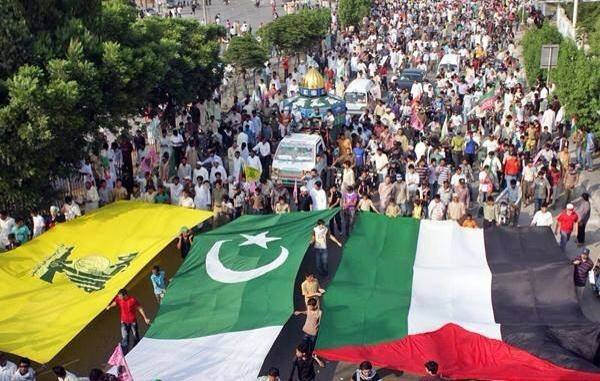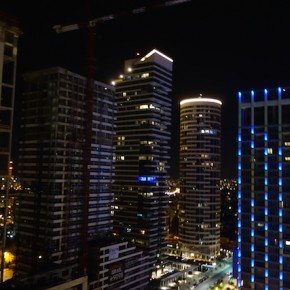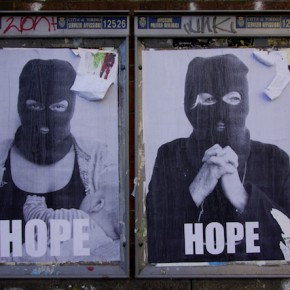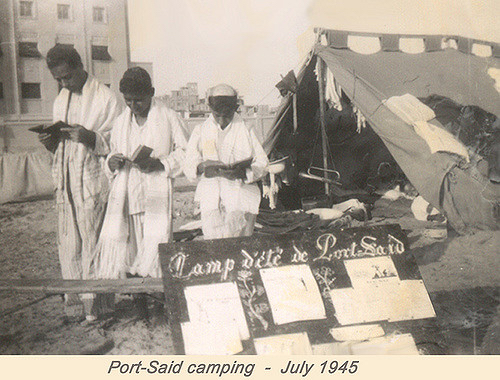Pakistanis love Gaza. The intense brutality of Israeli military campaigns there has always elicited our sympathy. As a result, we offer our solidarity, in the hopes that we can help change things for the better. Things aren’t that simple, though, and many Pakistanis fail to recognize that our tendency to view the conflict in religious terms isn’t helpful. Beyond that, though, we mostly fail to recognize that its core issues are also at play in Pakistan itself. Our protests have to be accurate, and they also need to recognize that Israeli militarism in Gaza is just one part of an international problem.
When discussing the Arab-Israeli conflict, many Pakistanis give into the temptation to fall back on religious rhetoric. There are two reasons why: (1) the conflict has adopted a more religious character at precisely the same time that Pakistanis as a whole have experienced a revival in Islamic practice and identity, and (2) Pakistani nationalism is obsessed with legitimizing itself through a rhetorical defense of the Muslim ummah.
We frequently ignore that this isn’t helpful. Palestine is not entirely Muslim, after all, and despite its aspirations to the contrary, Israel is not the sole representative of the Jewish faith. When Pakistanis assert that the conflict has an ethno-religious character, we distract everyone who is listening from the hard questions of power and disenfranchisement that are really at play. We (often inadvertently) propagate the fable that this is an ageless war between Muslims and Jews, rather than a complicated question of Israeli Zionism, and the role that Palestinians have in Jewish nationalism.
Moreover, the natural temptation built into this ethno-religious vision of politics is falling back on anti-Semitism to explain the conflict. Jews become crudely seen as a unified polity who dream of nothing else than “keeping Muslims down,” as though Israeli policy doesn’t also affect Palestinian Christians, who are also discriminated against, albeit rhetorically privileged over their Muslim compatriots. Nothing productive comes from this, obviously. When we ignore that the real issue is about Israeli intolerance of diversity – take a look at the plight of African migrants in the country – we do not have an accurate picture of what is happening.
One of the results of this ignorance is that we as Pakistanis are unable to remember that our own country pursues many similar policies to those at play in the Occupied Palestinian Territories. For all the backlash that the IDF’s supporters receive when they ask what foreigners would do if they were faced with a security threat like Hamas, they have a point. Whenever similarly post-colonial countries like Pakistan are faced with terrorism, they respond with brute force. In fact, the Pakistani military is doing this right now during Operation Zarb-e-Azb, the much-touted invasion of North Waziristan.

There are many differences between Azb and Operation Protective Edge, but its immediate cause (without context) is the same: terrorist attacks in the heartland. And for all the moral outrage that Pakistanis feel at the widespread Israeli opinion that Benyamin Netanyahu is being too soft on Gaza, that same cruelty is being echoed in the schadenfreude that is surrounding dead militants (including an unknown number of civilians) and Inter-Services Public Relations propaganda. It is easy for us to criticize the Israelis, but the fact is that in terms of government policy, we aren’t that different.
It goes further than that, though. Pakistanis are frequently critical of Israel’s refusal to implement the Right of Return, and in general, its deplorable policies towards Palestinian refugees. The hypocrisy becomes apparent here when these statements come from General Zia ul-Haq’s followers, who often minimize how Zia’s policies towards Afghan refugees were deeply informed by his own engagements with the Palestinians. Zia got his big break when he was stationed as a Brigadier in Jordan during the Black September insurgency. He exceeded his authority and advised King Hussein about the best way to defend the besieged monarchy from the Palestinian insurrection. Zia did this for careerist reasons, since he was looking for a way to shine during the War of Bangladeshi Independence. In the process though, he learned important lessons about leaving refugees to their own devices.
The Jordanian Civil War taught Zia that tribal and refugee populations can very quickly pose a political threat to the state that is housing them. For him, and many elites, the Palestinians were a worst-case scenario for the Afghan refugees in Pakistan. We are still dealing with the consequences of this revelation. Taming the refugees, and preventing them from organizing into their own version of the PLO, is part of the reason why Zia expanded Saudi influence in provinces like North Waziristan, and supported hardliners like Gulbuddin Hekmatayar. Salafi jihadists were considered far less likely to seriously challenge the Pakistani state than their left-wing equivalents. This strategy was pursued by Israel as well, which covertly aided groups like Hamas, from their founding, in order to drive a wedge in the national liberation movement.
The point is that Israeli excesses in Gaza do not end with Israeli policy in Gaza. They are one manifestation of a larger problem in the global War on Terror. The specter of Islamic jihad has allowed power centers to declare war on their most disenfranchised areas and populations. The motivation of national security has become warped to justify endless state violence against the disempowered. Israel does this in the Occupied Territories just as much as Pakistan does it in war-torn provinces like North Waziristan.
When advocating for the Palestinian cause, we as Pakistanis also need to ask a larger question. How does our sympathy with Gaza’s plight affect how we view our own state’s policies? Should we give into the temptation of ultra-violence, regardless of civilian casualties and moral deterioration? Or should an alternative vision of dialogue and hard structural change be pursued? These are questions facing any state with a serious Islamist insurgency. If we ignore them, then people like Netanyahu are right. We’re hypocrites.
Photographs courtesy of junaidrao. Published under a Creative Commons License.





